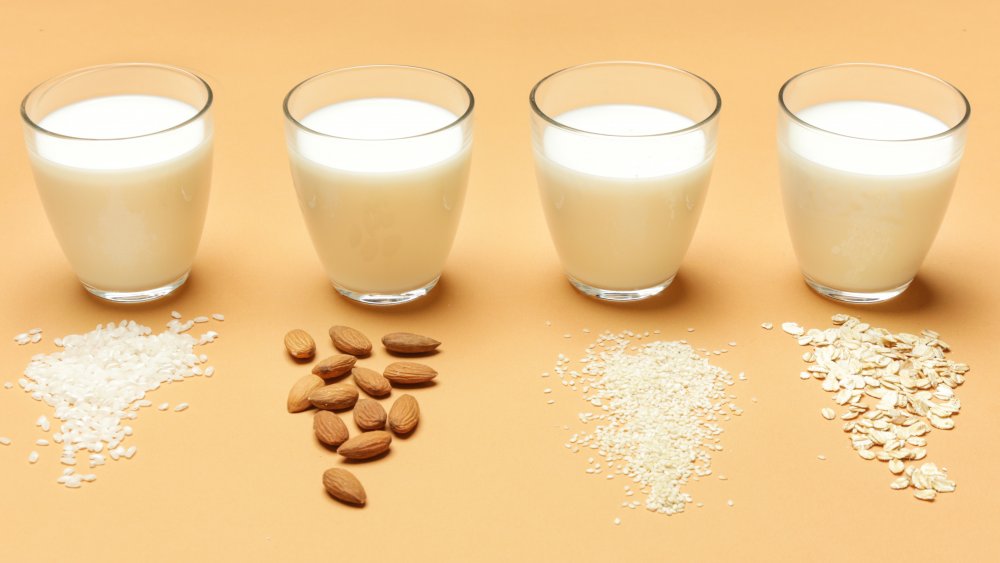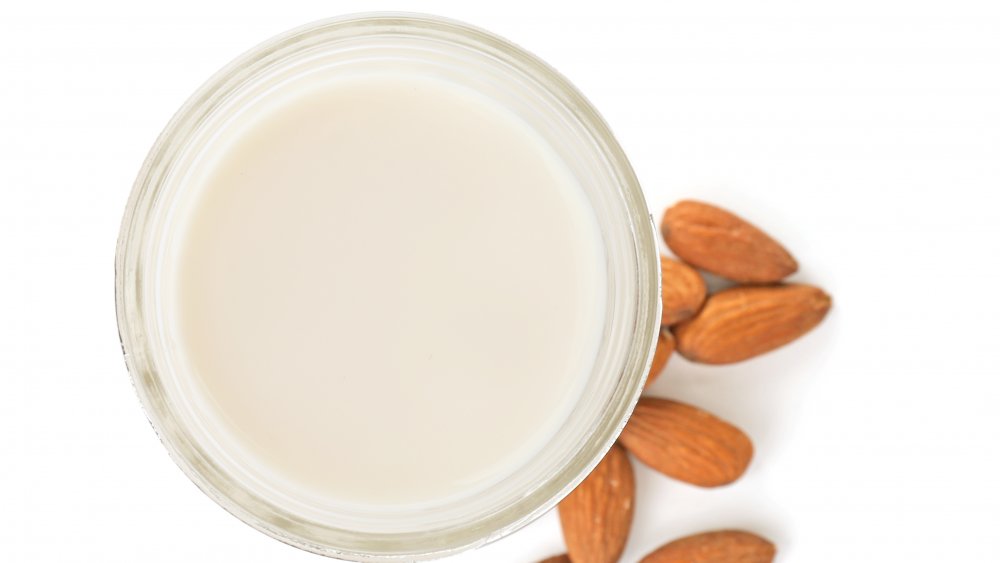What Is Plant Based Milk Actually Made Of?
The next time you go to the dairy section of your local supermarket, you may want to look at the number of non-dairy or alternative milks which have taken root in spaces once reserved for cow's milk. Plant milks are gaining traction among consumers for a variety of reasons including health (some drinkers are lactose intolerant, others are queasy about the amount of antibiotics that are being pumped into cattle); ethical beliefs (no animals are harmed or harassed to make plant milks); and the adoption of a vegan lifestyle (via American Society for Nutrition).
Plant-based milks are so popular that Practical Gastroenterology says dairy alternatives earned their manufacturers $21 billion in global sales between 2009 to 2015, and they're even starting to take up permanent residence on menu boards at popular chains like Starbucks.
The nutritional content of plant milks does vary
The nutritional content of plant-based milks varies depending on which grain, nut, or legume is used. Soy milk, which was really the first alternative drink for cow's milk, is made by soaking the beans, then crushing, cooking, and straining the mash, resulting in a creamy white beverage with omega-3 fatty acids, fiber, manganese, and magnesium. Soy milk is the only plant alternative that contains the same amount of protein as cow's milk, or about 8 grams per 8-oz cup, and is the least processed of all the plant-based milks in the market today.
Another popular non-dairy alternative is rice milk, which is made with boiled brown rice and brown rice starch. It may be the most hypoallergenic of all the plant-based milks, but it has no fiber and contains far less protein per cup than cow's milk at 1 gram per 8-oz serving). It also provides a small amount of natural calcium. Overall, rice milk is high in carbohydrates and is sweeter than cow's milk.
Nut milks don't have the same nutritional value as nuts
Few products have been marketed as aggressively as almond milk, which is made with ground almonds and water. Almond milk is gaining traction among alternative milk drinkers who aren't keen on (or are allergic to) soy, but like other nut milks, it's diluted with water, resulting in a lower calorie count (30 to 50 calories per cup, unsweetened).
Because of their heavy dilution, nut milks like almond milk don't have the same amount of nutrients normally found in nuts, and because protein from the almond is discarded with the pulp, the milk itself only contains 1 gram per 8-oz cup. In order to offer a comparable amount of vitamins and minerals to cow's milk, almond milk needs to be heavily processed and fortified.
Plant-based milk isn't for everyone
Before consumers buy into the hype and turn their backs on the dairy industry, nutritionists like Purdue's Distinguished Professor of Nutritional Sciences Connie Weaver says consumers ought to carry out due diligence over the kind of drinks they are consuming so they aren't caught off guard when their "milk" isn't as advertised. Practical Gastroenterology says most plant milks are diluted with water, have added ingredients such as sugar and carrageenan (which has been implicated in studies on ulcers), and thickeners like vegetable oil and sunflower lecithin.
"The plant-based beverages all cost a good deal more than cow's milk," Weaver says (via Best Food Facts). "So, one needs to determine how much they want to pay for the nutrients and determine which nutrients you need to get from other foods. A main nutrient expected from milk is calcium. Only soy milk has been tested for calcium bioavailability (by my lab) which was determined to be as good as from cow's milk. But none of the other plant beverages have been tested and they should be. None of the plant-based options match cow's milk entirely. Calcium-fortified soy milk is the closest to cow's milk but still lower in potassium and some other nutrients. Some plant-based beverages are very low in protein as well (like almond milk) which can be a problem for kids and the elderly."



